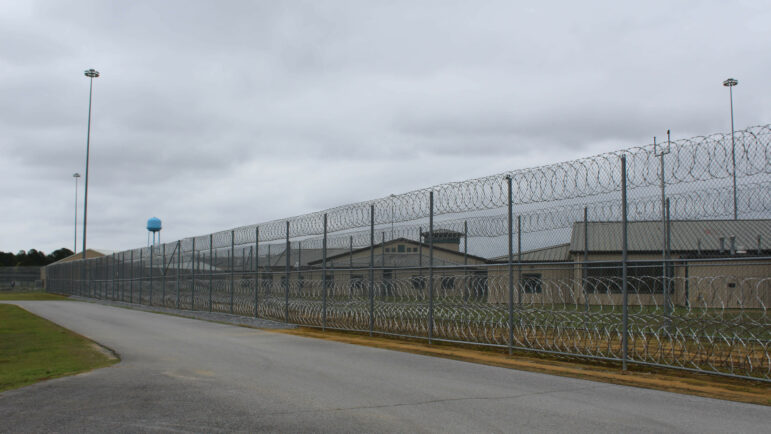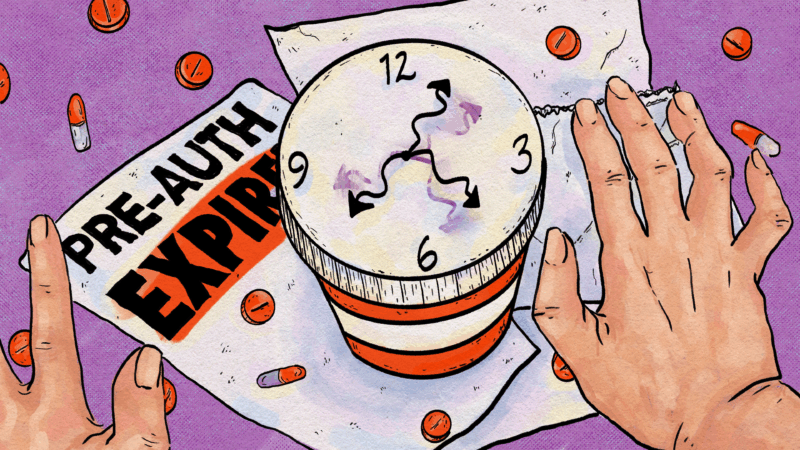Deliberate Indifference: A conversation about Alabama, Mississippi prison issues
Deliberate Indifference, a new 7-part podcast from WBHM’s Mary Scott Hodgin, debuted this week, highlighting the failures of the Alabama prison system and its track record for civil rights violations and overcrowding.
Hodgin sat down with Brittany Brown of the Gulf States Newsroom to talk about Alabama and Mississippi prisons, which have been under scrutiny by the U.S. Department of Justice in recent years.
Click the audio player above to listen to Hodgin’s and Brown’s conversation. The following transcription has been edited for clarity.
Brown: Tell me more about your podcast. What’s it called? When does it drop? What’s it about? I mean … you’ve been reporting on this for like months now, right?
Hodgin: Yeah, I have. Really, years, because I’ve been following it since the DOJ released its report. So, the podcast is called Deliberate Indifference, which comes from a legal term that is used throughout, you know, rulings on the prison system. And the [Department of Justice] uses it. And the idea is that the state is deliberately indifferent to the unconstitutional conditions inside its prisons — to the violence among incarcerated people. The podcast is seven episodes, and it’s really bookended by the DOJ involvement and the state’s response to it.
Because prisons — [it’s] really hard to know what’s going on inside. And so these reports, they really add a lot of clout to what people are saying inside prison.
Tell me about what’s been going on lately in Mississippi regarding prisons and prison conditions?

Brown: So, the Department of Justice opened an investigation in February 2020 into four Mississippi prisons, including Parchman. And the Department of Justice just published the report outlining the results of the investigation in April. And it’s about a 60-page report that goes so in-depth into how Parchman has, over the past few years and historically, violated prisoners’ constitutional rights by not providing access to mental health care, medical health care, not keeping them safe from other forms of violence from other prisoners, overusing and misusing solitary confinement. And that’s just one published report. The DOJ still has to publish three other reports from the three other prisons that it’s investigating here in Mississippi. We may be seeing a lawsuit come down on MDOC, some type of federal intervention.
I know there was a similar result for prisons in Alabama, right?
RELATED: Q&A: After DOJ’s Parchman report, what changes are needed at Mississippi Corrections?

Hodgin: Yes. The situation in Alabama is very similar. In 2019, the Department of Justice released the findings of its investigation about the whole prison system for men in Alabama. The DOJ found rampant violence and sexual assault among men incarcerated in the facilities. It laid out, you know, really in horrific detail, stories of men getting attacked, raped, murdered inside prison and a lack of response, a lack of attention by prison officials, by prison staff. But then fast forward to 2020, the Department of Justice released another report — part of the same investigation — and this one was about excessive use of force by staff. It detailed incidents of officers beating men while they were handcuffed. And then it detailed the deaths of two men who were killed by correctional officers in 2019. And then at the end of 2020, the Department of Justice filed a lawsuit, so the DOJ ended up suing Alabama a year and a half later, after that first report in April of 2019.
You know, I really tried to find the people that are impacted.
This is Hassani Jennings. He’s been in prison for nearly 30 years. You know, this is from the podcast. And he is, you know, talking about the report, the DOJ report and sort of what it meant when it came out.
Audiotape of Hassani: We know that change needed to happen, and we felt like it would be a catalyst to make something, you know, happen. So we sit here, and we see the problems and we live through the problems. But it’s like, you know, it doesn’t make a difference. We don’t have … we don’t have a voice to, you know, cause any positive change. So when the report came out, everybody was, a lot of, most guys were excited because, you know, it seemed like it was an opportunity for the public to see and for the public to instigate the change where we didn’t have the means to from the inside.

Brown: It’s been a lot of the same response here in Mississippi from prisoners and from loved ones of prisoners. I talked to a man in one prison in Mississippi. He asked me not to disclose where he’s at or his name. And I asked him about the DOJ report about Parchman and if what’s outlined in the report, if that’s, you know, things that he’s been seeing, experiencing, hearing about since he’s been incarcerated in Mississippi. And he said absolutely. He said these things have been going on since he entered prison.
Audiotape of Prisoner: A lot of this stuff can be changed if they had the proper manpower, if they had the proper staff. Not only the fact of the staff shortage, but you’ve got plenty of the staff that might not even care. So out of the ones, the few that they do have, out of that few, it’s a percentage that don’t care. So as far as surviving, the only way to really survive is you have to really want to change. And you have to accept so much. You’ve got to go through so much in the state of Mississippi.
New episodes of Deliberate Indifference will release every Wednesday. Subscribe to the podcast to get new episodes delivered directly to you at Apple Podcasts, Spotify, Google Podcasts, Stitcher, Pocket Cast or Audible.
This story was produced by the Gulf States Newsroom, a collaboration among Mississippi Public Broadcasting, WBHM in Alabama and WWNO and WRKF in Louisiana and NPR.
Why farmers in California are backing a giant solar farm
Many farmers have had to fallow land as a state law comes into effect limiting their access to water. There's now a push to develop some of that land… into solar farms.
Every business wants your review. What’s with the feedback frenzy?
Customers want to read reviews and businesses need reviews to attract customers. But the constant demand for reviews could be creating a feedback backlash, experts say.
Can’t get a prescription renewed? Here’s how to cope with prior authorizations
These health care hurdles can stand in the way of getting treatment your doctor says you need. Here's what to know about how to deal with them.
‘Get back to integrity’: Oklahoma’s Kevin Stitt on Republicans after Trump
NPR's Steve Inskeep asks Oklahoma Gov. Kevin Stitt about his spat with President Trump, immigration and the future of the Republican Party.
Civil rights leaders say the racial progress Jesse Jackson fought for is under threat
Activists say racial progress won by the Rev. Jesse Jackson is under threat, as a new generation of leaders works to preserve hard-fought civil rights gains.
Tariffs cost American shoppers. They’re unlikely to get that money back
After the Supreme Court declared the emergency tariffs illegal, the refund process will be messy and will go to businesses first.





